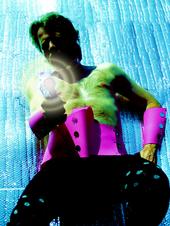Color My World Watch me play at Carnival in new video!
I am Bastard
Add to My Profile | More Videos
ARTURO BASTARD BIO
"Like Gangster and Guru" announced the very first "official" Arturo Bastard biographical article from the pages of "Giovani" magazine in late 1967. Heavy on rumor, humor and hearsay, not to mention the notoriously unreliable commentaries from Bastard himself, that writing is admittedly peppered with fantasies but at least some of it can be strained to yield a few provable historical facts.
It is commonly known that Arturo "The Bastard", as his adulators have dubbed him, was abandoned at birth to a Catholic orphanage; the possibly horrendous treatment he may have received there--he does not discuss it--drove him to more than simply physically escape to the streets of Rome, the famed home hundreds of other homeless street-urchins, it ultimately drove him to write songs about that life as well, and to play them veloce ed alto, "fast and loud" for anyone on the city streets who'd listen.
The few Lira he gained from these impromptu street-serenades encouraged the young musician to try for bigger fish. There's no hard proof that his first guitar came from an unlocked car, stolen in the night, as the lyric to "I am Bastard" recounts, but whether true or not, it has already been added to the growing Bastard legend and mythology. It's certainly clear that Arturo is gifted musically, to the ear of this writer and others, so a potentially early start is not out of the question.
While living in the streets of Rome, playing for money and sleeping under the stars, other competitors--the swarms of thieving, vagrant orphans--taunted the young Arturo by capitalizing on his unknown parentage; they called him "The Bastard". In response, he took the name they'd given him--he had no last name then-- and adopted it as his own, and legally, once he had the money to claim the name.
Rock Music as a genre had no firm foothold in Italy in the mid 1960s, at least not the hard, abrasive brand of "Arturo and the Bastards" as his first (of many) backing groups was named. Lighter Pop and attractive young singers' music held sway over the teenage audience, but The Bastards' musical performances were not light, nor was their singer particularly attractive, a fact Arturo was made keenly aware of by the Italian press, which goaded him toward more flamboyant costumes and wild theatrics; he promptly scrapped his pedestrian backing group, found new musicians, and dubbed his resultant new look and music "Peacock Rock".
Arturo toured Europe, ultimately landing in swinging London in April 1968, while Carnaby Street, wide ties and mod colors were all the new rage. The trend-setting kids there had no idea that the Bastard had beaten them to their own look by at least a year, but finding a receptive and responsive audience, the expatriated singer held no grudge but embraced the scene with all his enthusiasm and manic energy.
A film was made starring Arturo in 1969, shot for television by the German director Wilhelm Schwein, titled "The House in Black", which featured hallucinogenic dream sequences, non-sequitur cutting and other "artistic" techniques. The work was broadcast before Christmas of that year, and although the public seemed to welcome it, critical response was roundly unfavorable. Outside of variety show appearances, Bastard was not to be in another film for 17 years.
In early 1971, a story surfaced in the Italian press about an elderly washerwoman who'd come forward claiming to be the real mother of Arturo Bastard. Arturo himself, when informed, made no mad dash back home to meet with his long-lost Mama, but after a short tour of the Greek Islands he did secretly make his way to Rome for a private meeting. What was said and what might have been proven or resolved is not known publicly to this day, but regular payments were made to support the unnamed woman. Bastard refused to speak about her publicly, and the only clue to his true feelings lie buried, perhaps, in an album track called "O Mama Mia" from his fourth album "Many Moods", beautifully reflective as a piece of Classical music, but lacking completely any directly illuminating lyric.
Perhaps due the the innate fickleness of Pop audiences, Bastard found his audiences slowly shrinking and his influence decreasing as the 1970s arrived; his frenetic work-pace was never abandoned, however, and plans were hatched for a European TV music and dance program to be titled "Bastardo Sings". Troubles with producers and studios killed the series dead after only eight installments were completed, and of these only five made it to the air. By then, the proud Peacock had finally run out of his famously limitless energy and was forced by his failing health and nerves to seek shelter in an unnamed Swiss Sanitarium.
By the time Punk Rock reared its ugly head, Artuto Bastard had forsaken his peacock-rock struttings for a career as a romantic singer in plush nightclubs; it was only when a punk band named "Paradiso Elettrico", the sons of a fellow performer at Rome's "Petalo della Rosa" club, urged him onstage with them did he finally re-acknowledge the primal Rock roots that had since abandoned him, and which he'd tried desperately to escape from in revenge at his diminished popular status.
Into the 1990s Arturo has apparently made peace with himself and the World, and the audiences that both embraced and rejected him, and now follows what paths or muses avail themselves, and the new public and critical responses have generally been favorable.
Long Live The Bastard!
